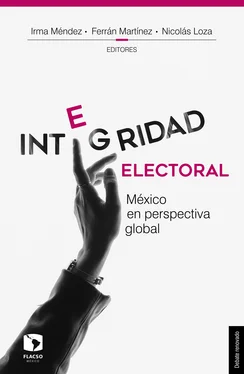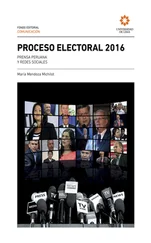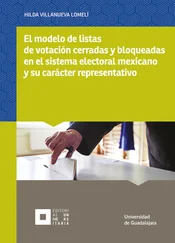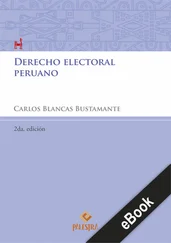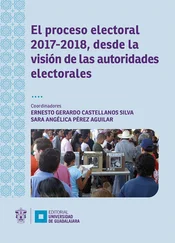ACE Project (2006). Voter Registration Standards and Country Case Studies . Recuperado el 7 de noviembre de 2017, de http://aceproject.org/electoral-advice/archive/questions/replies/705390374..
Alvarez, R. M., Katz, G. y Pomares, J. (2011). The Impact of New Technologies on Voter Confidence in Latin America: Evidence from e-voting Experiments in Argentina and Colombia. Journal of Information Technology & Politics , 8 (2), 199-217.
Ansolabehere, S. y Konisky, D. M. (2005). The Introduction of Voter Registration and its Effect on Turnout. Political Analysis , 14 (1), 83-100.
Atkeson, L., Bryant, L. A., Hall, T. E. y Saunders, K. L. (2010). A New Barrier to Participation: Heterogeneous Application of Voter Identification Policies. Electoral Studies , 29 (1), 66-73.
Avgerou, C., Ganzaroli, A, Poulymenakou, A. y Reinhard, N. (2009). Interpreting the trustworthiness of government mediated by information and communication technology: lessons from electronic voting in Brazil. Information Technology for Development , 15 (2), 133-148.
Baland, J.-M. y Robinson, J. A. (2008). Land and Power: Theory and Evidence from Chile. The American Economic Review , 98 (5), 1737-1765.
Barnes, T. D. y Rangel, G. (2014). Election Law Reform in Chile: The Implementation of Automatic Registration and Voluntary Voting. Election Law Journal , 13 (4), 570-582.
Barrat i Esteve, J., Goldsmith, B. y Turner, J. (2012). International Experience with E-Voting . Washington: International Foundation for Electoral Systems. Recuperado el 8 de noviembre de 2017, de https://www.parliament.uk/documents/speaker/digital-democracy/IFESIVreport.pdf.
Benedikter, R., Siepmann, K. y Zlosilo, M. (2015). The Political Dimension: Chile After the Presidential and General Elections of 2013-What Future? En R. Benedikter y K. Siepmann (Eds.), Chile in Transition: Prospects and Challenges for Latin America’s Forerunner of Development (pp. 79-102). Suiza: Springer International Publishing.
Bentele, K. G. y O’Brien, E. E. (2013). Jim Crow 2.0? Why States Consider and Adopt Restrictive Voter Access Policies. Perspectives on Politics , 11 (4), 1088-1116.
Bipartisan Policy Center. (2014). Commission on Political Reform, Governing in a Polarized America: A Bipartisan Blueprint to Strengthen our Democracy . Recuperado el 7 de noviembre de 2017, de https://bipartisanpolicy.org/wp-content/uploads/2019/03/BPC-CPR-Report.pdf.
Bodzin, S. (2011). Chile’s Voter Registration Reform Gives Major Boost to Democracy. Christian Science Monitor . Recuperado el 8 de noviembre de 2017, de https://www.csmonitor.com/World/Americas/Latin-America-Monitor/2011/1222/Chile-s-voter-registration-reform-gives-major-boost-to-democracy.
Bracconier, C., Dormagen, J.-Y. y Pons, V. (2017). Voter Registration Costs and Disenfranchisement: Experimental Evidence from France. American Political Science Review , 111 (3), 584-604.
Brennan Center for Justice. (2017). Automatic Voter Registration . Recuperado el 8 de noviembre de 2017, de https://www.brennancenter.org/analysis/automatic-voter-registration.
Burden, B. C., Canon, D. T., Mayer, K. R. y Moynihan, D. P. (2011). Early Voting and Election Day Registration in the Trenches: Local Officials’ Perceptions of Election Reform. Election Law Journal , 10 (2), 89-102.
Cancela, J. y Geys, B. (2016). Explaining Voter Turnout: A Meta-analysis of National and Subnational Elections. Electoral Studies , 42 , 264-275.
Carey, J. y Horiuchi, Y. (2013, 10 de noviembre). Buyer’s remorse in Chilean elections? The Washington Post . [Monkey Cage: Newsletter]. Recuperado el 8 de noviembre de 2017, de https://www.washingtonpost.com/news/monkey-cage/wp/2013/11/10/buyers-remorse-in-chilean-elections/?utm_term=.e2b7198b34eb.
Contreras, G., Joignant, A. y Morales, M. (2016). The Return of Censitary Suffrage? The Effects of Automatic Voter Registration and Voluntary Voting in Chile. Democratization , 23 (3), 520-544.
Corvalan, A. y Cox, P. (2017). The Impact of Procedural Information Costs on Voting: Evidence from a Natural Experiment in Chile. Political Behavior , 40 (1), 3-19.
Cottrell, D., Herron, M. C. y Westwood, S. J. (2017). An Exploration of Donald Trump’s Allegations of Massive Voter Fraud in the 2016 General Election. Electoral Studies , 51 , 123-142.
Da Costa-Abreu, M. y Smith, S. (2017). Using Biometric-based Identification Systems in Brazil: A Review on Low Cost Fingerprint Techniques On-the-go. Computer Law & Security Review , 33 (5), 629-634.
Dahlberg, S., Holmberg, S., Rothstein, B., Alvarado, N. y Svensson, R. (2018). The Quality of Government Basic Dataset , version Jan18. University of Gothenburg: The Quality of Government Institute, http://www.qog.pol.gu.se/doi:10.18157/QoGBasJan18.
De Luca, G. (2014). Electoral Registration and the Control of Votes: The Case of Chile. Electoral Studies , 34 , 159-166.
European Union Election Observation Mission (EU EOM). (2013). Honduras. Final Report on the General Elections, 2013 . Recuperado el 8 de noviembre de 2017, de http://www.eods.eu/library/EUEOM%20FR%20HONDURAS13.02.2014_en.pdf.
Freedom House. (2017). Freedom in the World: Aggregate and Subcategory Scores . Recuperado el 8 de noviembre 2017, de https://freedomhouse.org/report/freedom-world-aggregate-and-subcategory-scores.
Fujiwara, T. (2015). Voting Technology, Political Responsiveness, and Infant Health: Evidence from Brazil. Econometrica , 83 (2), 423-464.
Gerken, H. (2013). Make It Easy: The Case for Automatic Registration. Democracy , 28 , 17-21.
Grömping, M. y Martínez i Coma, F. (2015). Electoral Integrity in Africa. Camperdown: Electoral Integrity Project/Hanns Seidel Foundation.
Hajnal, Z., Lajevardi, N. y Nielson, L. (2017). Voter Identification Laws and the Suppression of Minority Votes. Journal of Politics , 79 (2), 363-379.
Hasen, R. L. (2018). What Happened? The 2016 U. S. Voting Wars-From Bad to Worse. En P. Norris, S. Cameron y T. Wynter (Eds.), Fake Elections? Voter Inclusion and Security in America .
Hicks, W. D., Mckee, S. C., Sellers, M. D. y Smith, D. A. (2015). A Principle or a Strategy? Voter Identification Laws and Partisan Competition in the American States. Political Research Quarterly , 68 (1), 18-33.
Hidalgo, D. (2010). Digital Democratization: Suffrage Expansion and the Decline of Political Machines in Brazil . [Manuscrito]. Los Ángeles, California: Department of Political Science, University of California at Berkeley.
International Institute for Democracy and Electoral Assistance (International IDEA). (2017). Introducing Biometric Technology in Elections . Recuperado el 25 de enero de 2018, de https://www.idea.int/sites/default/files/publications/introducing-biometric-technology-in-elections.pdf.
International Institute for Democracy and Electoral Assistance (International IDEA). (2002). International Electoral Standards: Guidelines for Reviewing the Legal Framework of Elections . Recuperado el 8 de noviembre de 2017, de https://www.idea.int/publications/catalogue/international-electoral-standards-guidelines-reviewing-legal-framework.
Jungmann, M. (2014). Biometric Voting Machine to be Used by 21.6 Million Brazilians. Agência Brazil . Recuperado el 8 de noviembre de 2017, de http://agenciabrasil.ebc.com.br/en/politica/noticia/2014-08/biometric-voting-machine-be-used-216-million-brazilians.
Читать дальше
